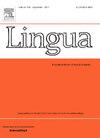伪窃听中语音不匹配的实验研究:来自可接受性判断和处理的见解
IF 1.3
3区 文学
0 LANGUAGE & LINGUISTICS
引用次数: 0
摘要
本文研究了伪重叠结构的可接受性和处理,重点研究了先行句和省略句之间语音不匹配的难题(例如,Tom会研究我的问题,但他不会研究你的问题)。虽然句法解释预测了这种不匹配的不语法性,但语义解释表明它们应该是可以接受的。通过两个可接受性判断实验和一个自定节奏阅读实验,我们研究了这些不匹配如何与已知影响省略的因素相互作用:信息结构和先行词的句法复杂性。可接受性判断实验结果表明,语音失配会持续降低可接受性,其影响随信息结构和前词复杂性的相互作用而变化。自定速阅读实验进一步表明,语音不匹配导致省略号和省略号前的阅读时间延长。此外,信息结构和前件复杂性独立影响加工,后者也调节语音不匹配的影响。这些发现表明,伪标记并不完全抵抗语法不匹配;然而,它的判断和加工受到句法同一性以外的因素的影响。本文章由计算机程序翻译,如有差异,请以英文原文为准。
An Experimental Investigation into Voice Mismatches in Pseudogapping: Insights from Acceptability Judgments and Processing
This paper investigates the acceptability and processing of the pseudogapping construction, focusing on the puzzle of voice mismatch between the antecedent and elliptical clauses (e.g., My problem will be looked into by Tom, but he won’t yours.). While syntactic accounts predict ungrammaticality for such mismatches, semantic accounts suggest that they should be acceptable. Through two acceptability judgment experiments and a self-paced reading experiment, we examine how these mismatches interact with factors that are known to influence ellipsis: information structure and the syntactic complexity of the antecedent. Results of the acceptability judgment experiments indicate that voice mismatch consistently lowers acceptability, with its impact varying by interaction with information structure and antecedent complexity. The self-paced reading experiment further shows that voice mismatch leads to longer reading times both at and before the ellipsis site. In addition, information structure and antecedent complexity independently influence processing, with the latter also modulating the effects of voice mismatch. These findings suggest that pseudogapping is not entirely resistant to syntactic mismatches; however, its judgment and processing are shaped by factors beyond syntactic identity.
求助全文
通过发布文献求助,成功后即可免费获取论文全文。
去求助
来源期刊

Lingua
Multiple-
CiteScore
2.50
自引率
9.10%
发文量
93
审稿时长
24 weeks
期刊介绍:
Lingua publishes papers of any length, if justified, as well as review articles surveying developments in the various fields of linguistics, and occasional discussions. A considerable number of pages in each issue are devoted to critical book reviews. Lingua also publishes Lingua Franca articles consisting of provocative exchanges expressing strong opinions on central topics in linguistics; The Decade In articles which are educational articles offering the nonspecialist linguist an overview of a given area of study; and Taking up the Gauntlet special issues composed of a set number of papers examining one set of data and exploring whose theory offers the most insight with a minimal set of assumptions and a maximum of arguments.
 求助内容:
求助内容: 应助结果提醒方式:
应助结果提醒方式:


